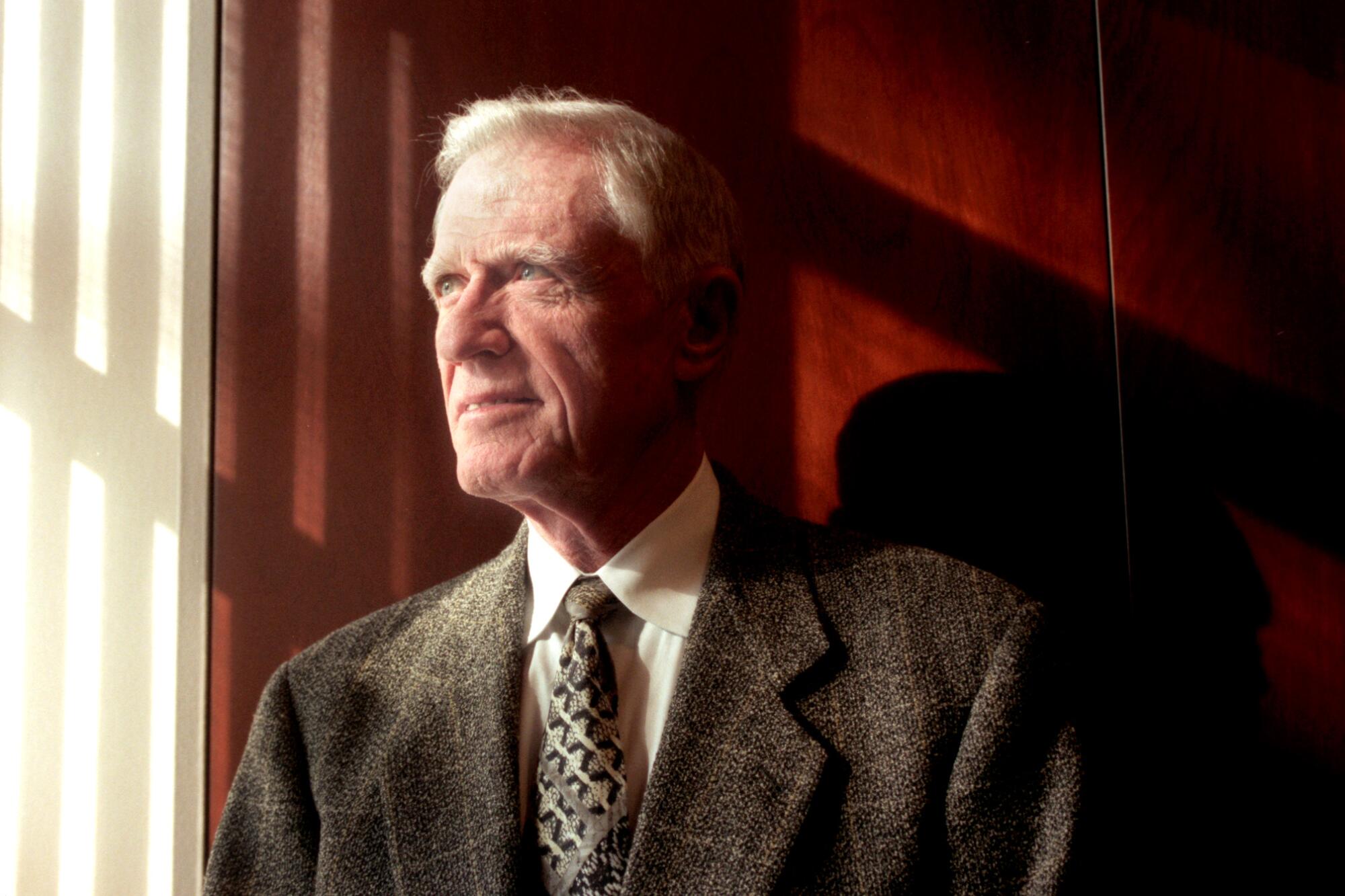
- Share via
Charles E. Young, the fiery, fiercely outspoken chancellor of UCLA credited with turning the campus into an academic powerhouse, died of natural causes Sunday at his home in Sonoma, Calif. He was 91.
At the helm of UCLA for 29 years, Young oversaw its transformation from a small regional campus to one of the nation’s premier research universities.
“During his long tenure, Chuck Young guided UCLA toward what it is today: one of the nation’s most comprehensive and respected research universities and one that is profoundly dedicated to inclusiveness and diversity,” UCLA Chancellor Gene Block said in a statement announcing Young’s death.
When Young started in the job at the age of 36 in 1968, he was the youngest chancellor in University of California history. When he retired in 1997, he would be one of the longest-serving leaders of an American university.
UCLA grew rapidly under his watch. Its annual operating budget increased tenfold to $1.7 billion. The number of undergraduates increased from 19,000 to 24,000. And the number of endowed professorships rose from one to more than 100.
At the time of his retirement, the president of the American Council on Education called Young “one of the most admired and respected figures in American higher education.”
Young regularly sparred with his bosses on the UC Board of Regents.
Just months after becoming chancellor, Young famously refused to fire political activist Angela Davis, then an acting professor in UCLA’s philosophy department, despite pressure from the regents after they learned she was a member of the Communist Party.
Young would call the episode a “seminal moment” in his career, catapulting him into the national spotlight and allowing him to clearly carve out a position on academic freedom.
And when the board debated how to implement a ban on affirmative action in admissions, Young, a staunch supporter of affirmative action, rallied loudly against the plan. He often spoke publicly about the importance of ensuring public universities are easily accessible to students of color.
“The notion that we’re doing it for ‘them’ is wrong,” Young said a year before he retired. “This is something we do for all of us.”
Through the years, the academic leader widely known as “Chuck” rode out the turbulence of campus radicalism and state politics. He was a commanding figure who came to be recognized as a superb manager with an exceptionally quick mind. And he lived down early skepticism that he was too young, too much the hand-picked choice of his predecessor, Franklin D. Murphy, and not enough of a scholar to last long amid the intellectual battles of academia.
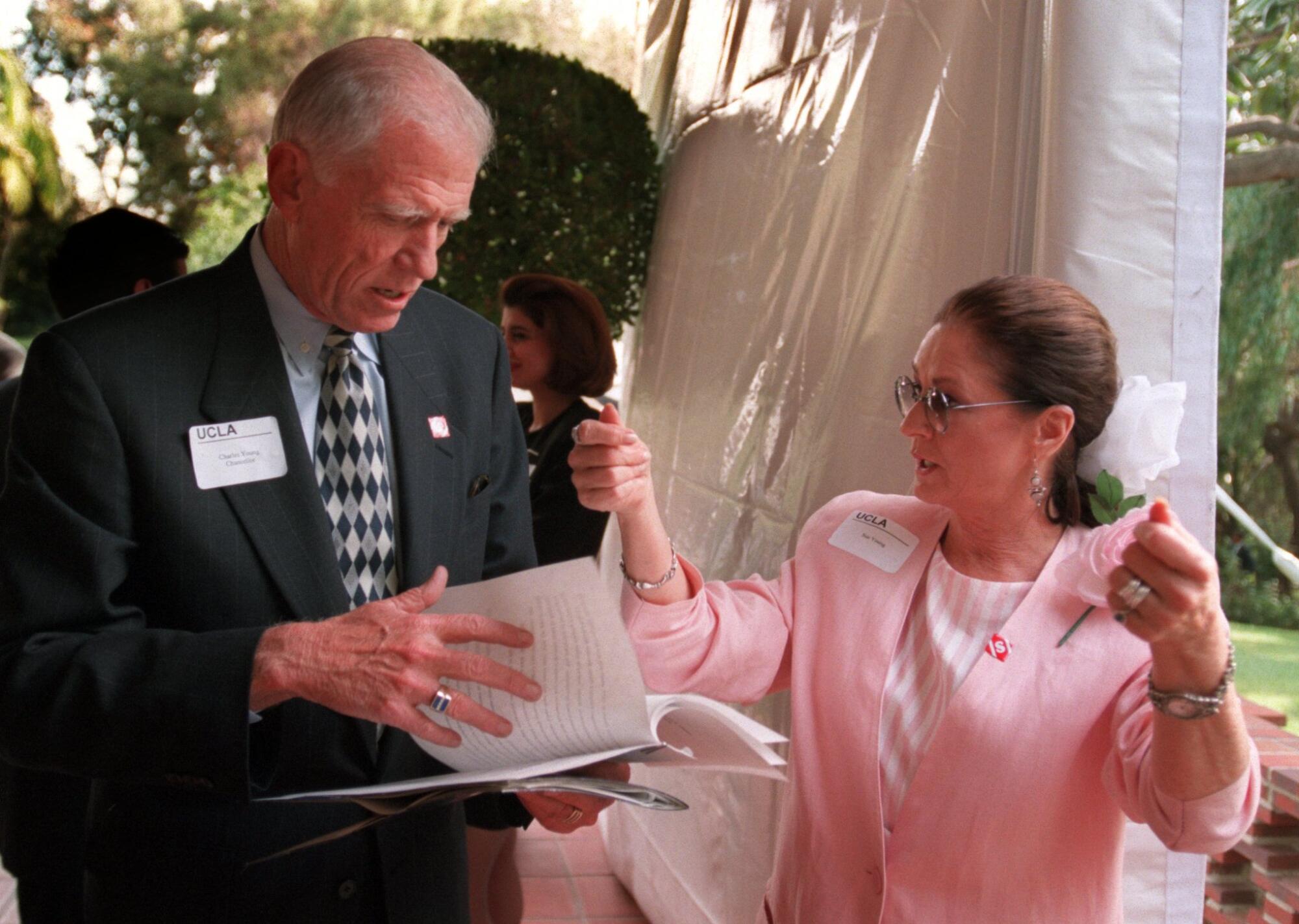
Charismatic and sometimes hot-tempered, Young defied the image of a bookish academic leader. He sought to run UCLA more like a private institution and was a respected fund-raiser who developed a network of high-profile entertainment friends such as composer Henry Mancini, movie producer Walter Mirisch and actor Charlton Heston.
Young earned a doctorate in political science from UCLA — only eight years before becoming the campus’ chancellor — but he had little or no work published in academic journals.
“Young makes no pretense of being a scholar,” said a 1968 article in Time magazine about his selection by the Board of Regents to head UCLA. He was chosen, the magazine said, “primarily because of his record as an administrator who can get along with students,” during a time of heightened political tension because of the Vietnam War and the growing Black empowerment movement.
By the time he retired, UCLA’s faculty had doubled and the school’s operating budget was more than 10 times larger than when he started. On his watch, the number of endowed professorships climbed from one to nearly 120.
During his reign, UCLA emerged as an athletic powerhouse, winning 61 men’s and seven women’s NCAA Division I team championships in an array of sports. He was not a distinguished athlete himself — his main achievement in organized sports was playing football in his senior year of high school. But he was an enthusiastic spectator at UCLA athletic events, rarely missing a home football or basketball game.
Early on, Young earned praise for his sympathetic handling of student unrest. A few months after he became chancellor, two student members of the Black Panther Party were killed on campus in an alleged dispute over the leadership of the Black Studies Center. Young helped calm the jittery school. Later, during Vietnam War protests, he refused to allow police to clear out students who had occupied administration offices.
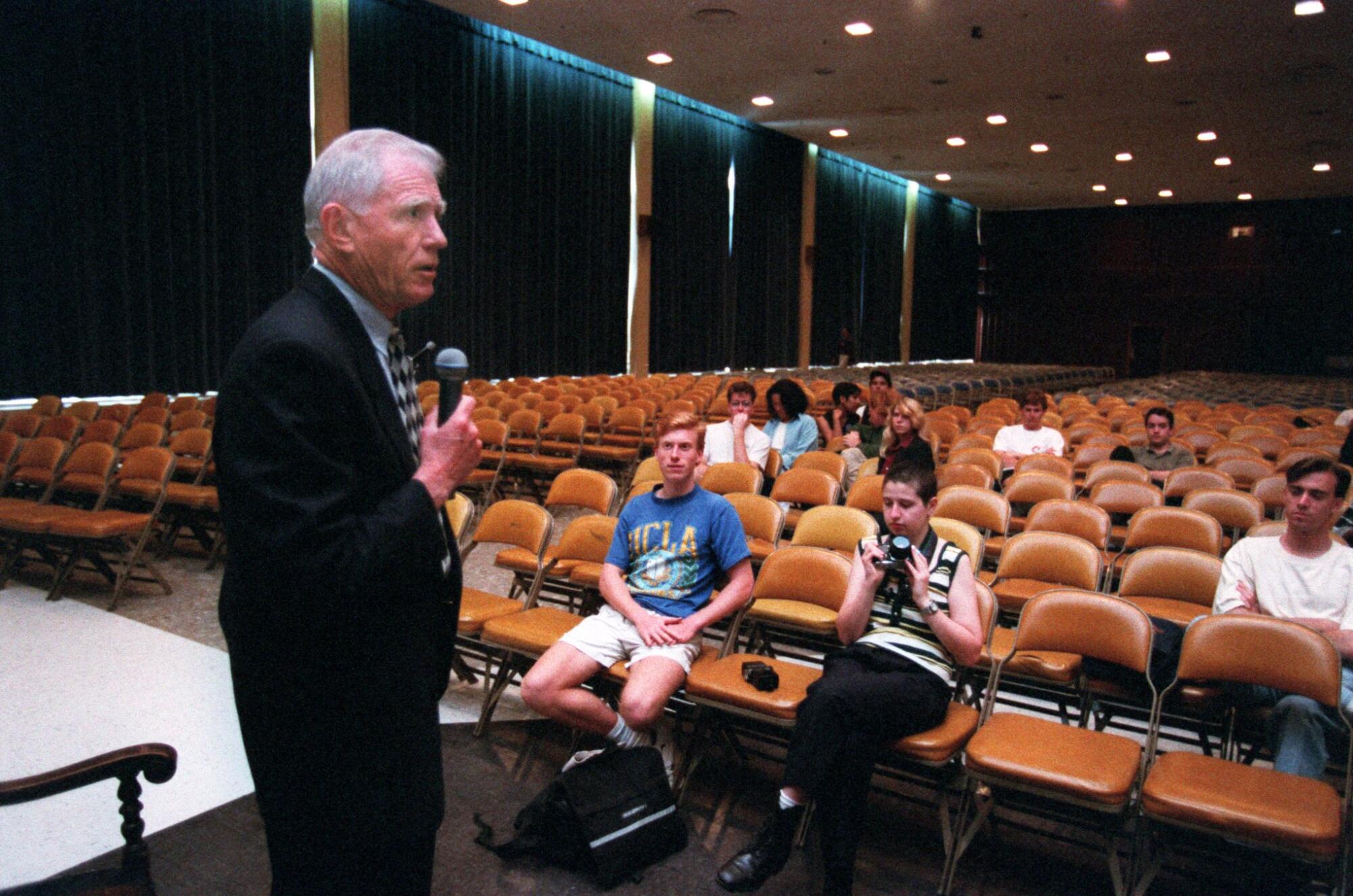
But one of Young’s most dramatic challenges came shortly after his formal inauguration as chancellor on May 23, 1969, when he defied UC regents by refusing to fire Davis over her membership in the Communist Party. The regents themselves eventually ousted Davis at UCLA, although she later returned to the UC system to teach at UC Santa Cruz and, in 2014, nearly a half-century after her ouster from UCLA, triumphantly returned to campus as a Regent’s Lecturer in gender studies, a prestigious appointment.
Young’s defense of Davis’ right to work at UCLA led to what he later described as an emotionally draining series of confrontations with then-Gov. Ronald Reagan, who urged regents to oust Davis.
In 1970, Young told The Times, “At some point there has got to be a time when somebody in this university stands up and says, ‘I’ve had it. I’ve had enough.’ This is a real case of academic freedom because Angela Davis is an undesirable character to much of the public.... The place where you find out whether the system works is in the tough cases, not the easy ones everybody agrees with.”
Years later, Young elaborated, saying, “I was not supporting Angela Davis, I was supporting the principle. Angela Davis was a mediocre scholar and a mediocre lecturer and a mediocre person, as far as I could tell.” Other academics, however, had a far more favorable view of Davis, whom they saw as an important intellect whose call for anti-racist action is only now being embraced.
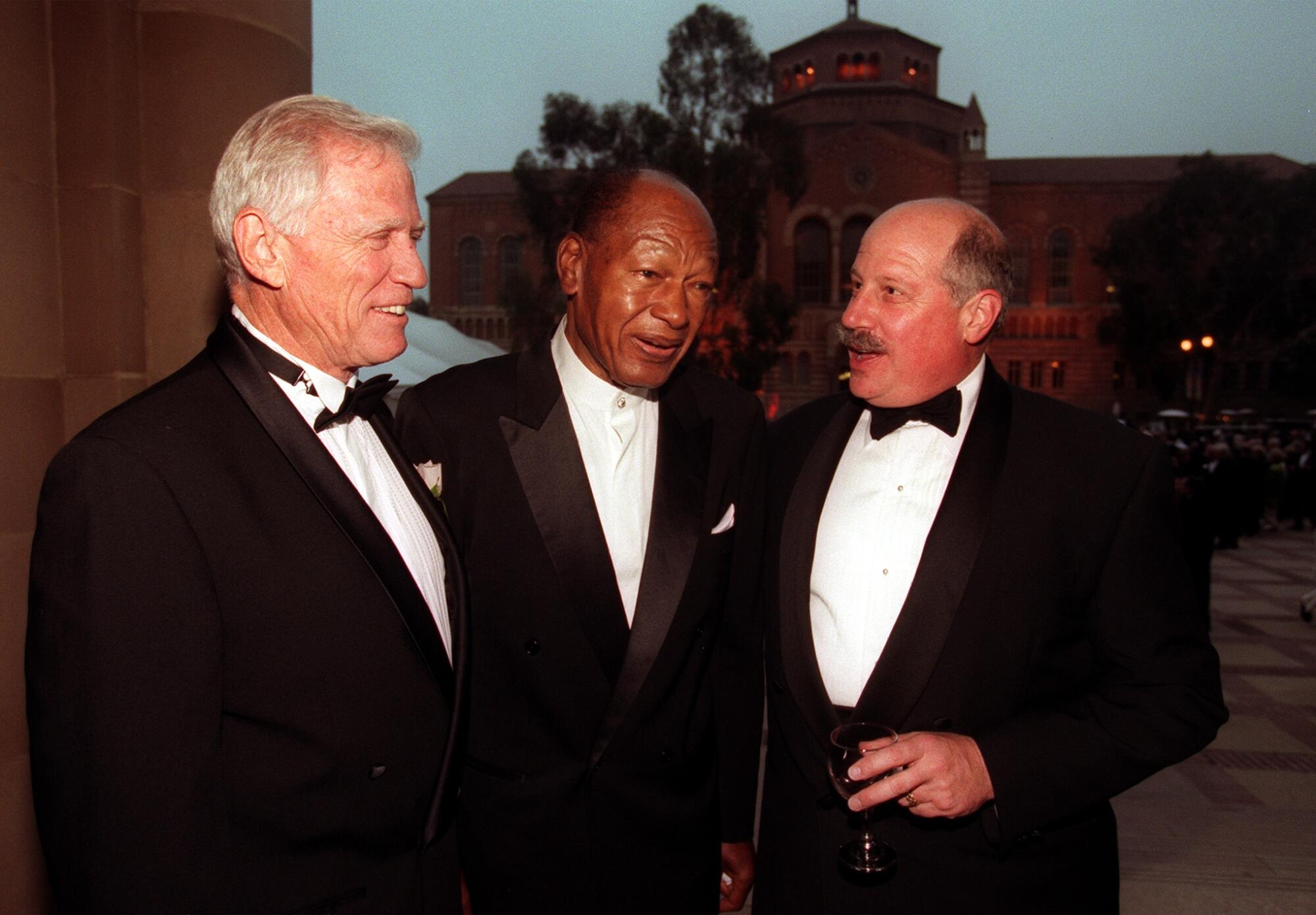
Over his long tenure, Young encountered criticism over financial and compensation issues. An associate, a UCLA vice chancellor, was prosecuted, fired and forced to repay the university’s fund-raising foundation $85,000 in disallowed expenses. Investigations found no impropriety by Young in that episode or with UCLA donors paying the rent for the chancellor’s summer beach house, yacht club membership or vacation trip to Tahiti — but criticism mounted.
In the early 1990s, particularly after an unsuccessful bid to become president of the UC system, Young was faulted by critics for becoming a disengaged chancellor who was living like a highly paid corporate CEO. A Times investigation in the mid-1990s found that Young and his top aides in some cases were instrumental in giving special consideration in admissions, at the request of donors and other well-connected figures, to less-qualified or rejected applicants.
Young, in turn, occasionally unleashed his temper on his opponents. He triggered a brief flap with then-UC Regent Ward Connerly, a foe of affirmative action, by comparing him to the late Jesse Helms, a staunch conservative Republican senator from North Carolina who had voted against civil rights legislation. Young, though an ardent supporter of affirmative action, later apologized to Connerly.
When he announced his plans to retire, Young was widely praised for elevating UCLA’s stature, but some critics said his departure was overdue.
Young endured turmoil and tragedy in his personal life. He was arrested for drunk driving after a car wreck near the campus in 1975, during a period of personal problems. Later on, he called it a “near-crisis situation” and admitted he had a problem with alcohol, which he resolved by getting sober.
Young was born in San Bernardino on Dec. 30, 1931, the only son of two psychiatric nursing aides at Patton State Hospital in Highland. His parents separated when he was a child.
In his oral history, Young recalled a childhood of growing up in a rural, orange-growing region. He taught himself to read by age 4 and got his first job at a local packinghouse at 12.
He attended San Bernardino Valley College, where he met his first wife, Sue Daugherty. They married in 1950, when both were 18.
Young soon dropped out of school and took a job in the appliance department of a department store. He was then called to active duty with the Air National Guard during the Korean War and served in Japan.
After his stint in the military, Young returned to San Bernardino Valley College and became a determined, standout student. He went on to receive his bachelor’s degree at UC Riverside, where he was the new campus’ first student body president. From there he earned a master’s and a doctorate in political science at UCLA.
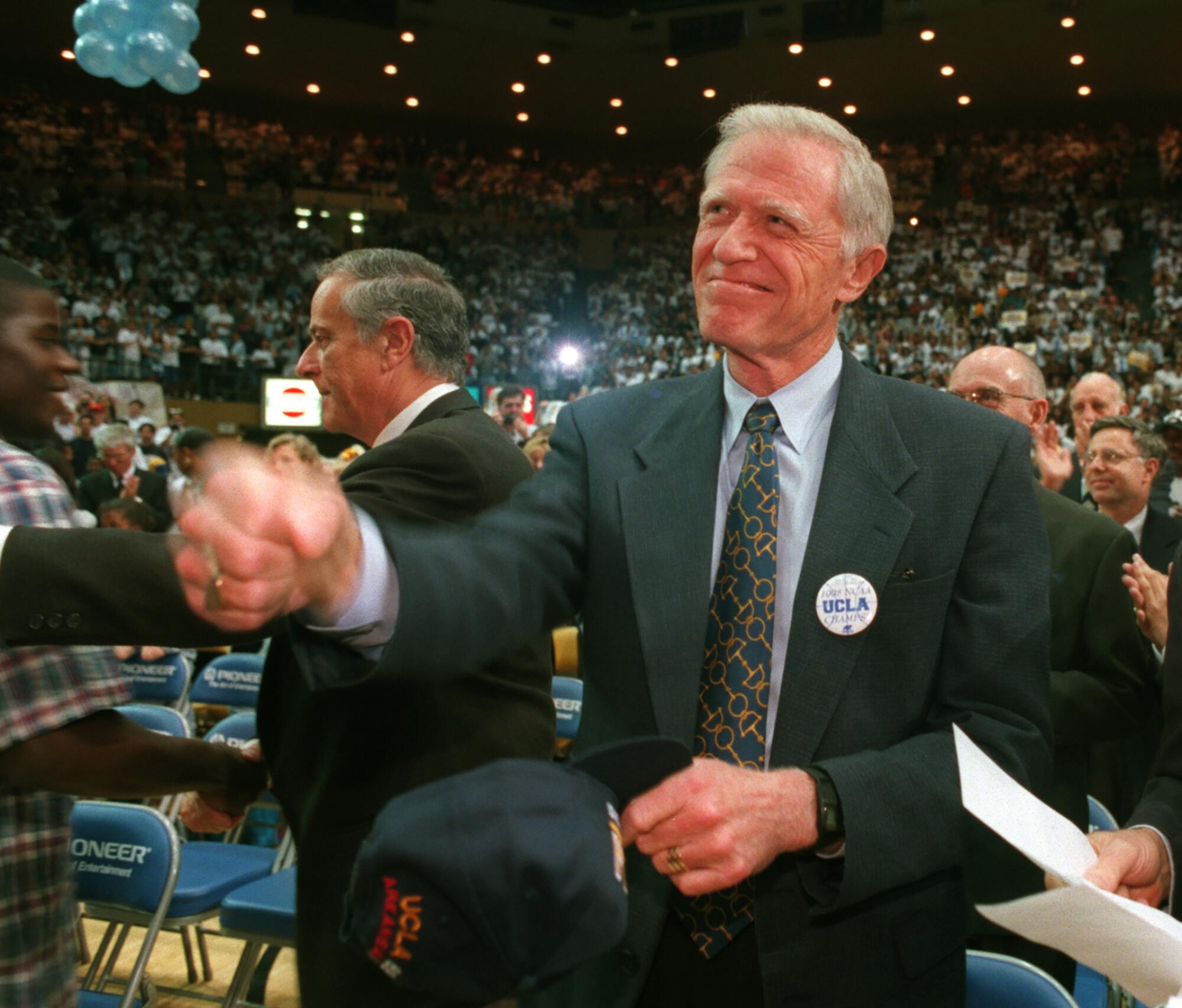
After serving as a congressional fellow in Washington, D.C., Young joined the staff of UC President Clark Kerr in 1959. In that role, he worked on the creation of the state’s master plan for higher education, which continues to guide policy in California.
In 1960, the same year he earned his doctorate with a dissertation on legislative redistricting, Young went to work on the Westwood campus as an assistant to Murphy, then the school’s new chancellor. He quickly moved up the ladder, eventually becoming vice chancellor for administration and a full professor in the political science department before being named by UC Regents to succeed Murphy in 1968.
Two years after retiring from UCLA, Young accepted what was to be a short-term interim appointment as the president of the University of Florida in Gainesville, but he wound up staying for four years. Later, at age 72, he became president of an educational and scientific foundation in Qatar, a stint that lasted slightly over a year.
In the fall of 2008, at the age of 76, Young returned to UCLA to teach an undergraduate public policy and political science course on the history of the American presidency. That same year, Young was asked by philanthropist Eli Broad to help lead the Museum of Contemporary Art out of financial peril after its endowment shriveled from $40 million to $6 million in just nine years.
Seemingly unable to retire for long, Young agreed in 2017 to take over as superintendent of the public school district in Sonoma, where he and his wife retired to be closer to family. The K-12 district was battered by financial difficulties and led by what he believed was a dysfunctional school board.
But his affection for UCLA never waned, and he returned again and again, sometimes simply to stroll across the campus.
“I’m amazed at the fact that I can wander around this campus and be treated like an old friend,” Young said. “And I think, in a way, that’s the accomplishment.”
His wife of 51 years, Sue K. Young, a major force in UCLA fundraising, died in 2001 after battling breast cancer for years. One of their two children, Elizabeth, died in 2006 after suffering a cerebral aneurysm while walking on the beach near Malibu.
For the record:
5:28 p.m. Oct. 23, 2023An earlier version of this article referred to Charles Young’s wife, Judy Young, as Judy Cornell.
Young is survived by his wife, Judy Young, whom he married in 2002, and son, Charles Jr. In a statement Sunday, UCLA said it is planning an event in the coming months to celebrate his legacy.
Silverstein is a former Times staff writer.
More to Read
Sign up for Essential California
The most important California stories and recommendations in your inbox every morning.
You may occasionally receive promotional content from the Los Angeles Times.









